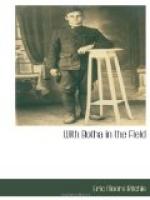It was but natural. Cut off the wire and rail communication of a South African veld town and you have isolation in the most thorough sense. In such a place at such a time mere statement may seem quite possibly the truth.
Towards evening we got news of the rebels, and a night-march was ordered. As we left the town the loyal people lined the streets, the fellows in the columns whistled “Tipperary,” and we got a rousing farewell.
[Illustration: Group of Rebel Leaders] [Illustration: Rebels rounded up after the capture of De Wet]
General Botha is celebrated amongst fighting men for many things, and his night-marching is one of them. He appears to believe to the fullest extent in night-marching. He had located De Wet at a place called Mushroom Valley, and parts of the Commander-in-Chief’s forces had been sent to make a surrounding movement. During the all-night trek from Winburg to Mushroom Valley I had a first thorough experience of the true horrors of sleep-fighting. It was bitterly cold—cold as the Free State night on the veld knows how to be. And we could not smoke, could not talk above a faint murmur, and nodded in our saddles. The clear stars danced fantastically in the sky ahead of us, and the ground seemed to be falling away from us into vast hollows, then rising to our horses’ noses ready to smash into us like an impalpable wall. After midnight, outspanning in a piercing wind, we formed square; main guard was posted over the General’s car, and those lucky enough to escape turn of duty huddled together under cloaks and dozed fitfully until two-thirty. From two-thirty till sunrise we trekked on. Suddenly, just after good daylight, the Staff halted the column, glasses were put up, and away we swung half right into the veld. Up came the artillery and opened fire on a cluster of ant-sized figures four thousand yards ahead beneath the shoulder of a kopje. Had the thing not contained the very germ of tragedy it would have been laughable to see the way those figures scattered over the red veld. It was De Wet’s commandos caught napping. Just before the shell fire our burghers had gone out ahead hell-for-leather on either flank. The whole column then advanced. After two hours’ pretty hot work the action was over. We lost six killed against the rebels’ twenty-two, and with twenty wounded on our side the rebel losses were proportionate. We took upwards of three hundred prisoners, De Wet himself escaping by the merest fluke. He lost all his transport, and generally ceased after the action to be a serious menace.
During the operations against De Wet I watched, when possible, the demeanour of the quiet South African patriot with whom fate had placed me in the field. I had last seen him many years before, gravely bowing from under a silk hat to a crowd that swayed and cheered as he drove through the streets of Manchester. And now duty found him in the field against an old comrade-in-arms. There was a sadness, there was a profound pathos about it. No wonder if to me it seemed that General Botha looked downcast indeed, if stern as well, during the Rebellion. Life, surely, was not dealing too fairly by him.




